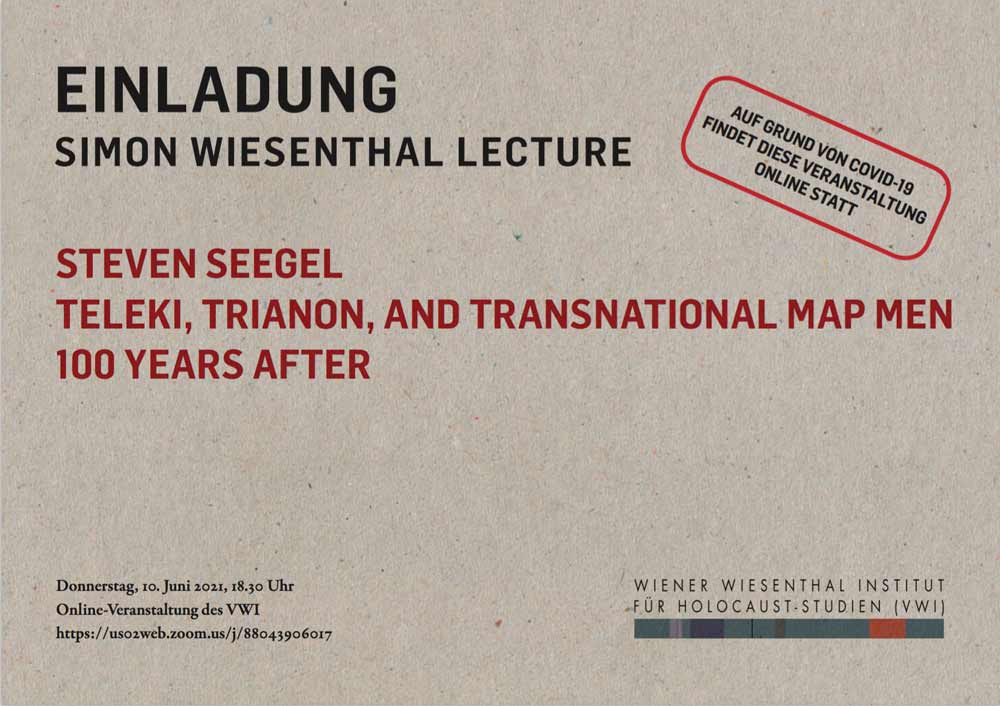Simon Wiesenthal Lectures
The Simon Wiesenthal lecture series takes place regularly every six to eight weeks and aims to present the latest research findings on the Holocaust to both a professional and a broader audience. They take into account the impressive spectrum of this discipline, the numerous questions and issues from empirical-analytical historiography to topics of cultural studies and involve young scholars as well as established academics.
Since 2007, when the Vienna Wiesenthal Institute for Holocaust Studies (VWI) was still being established, the lecture series – at that time in cooperation with the Documentation Centre of Austrian Resistance (DÖW) and the Institute of Contemporary History at the University of Vienna– has developed into the flagship of the VWI's outreach activities as a supporting element in the communication of recent academic findings in the field of Holocaust research and Holocaust and genocide studies.
For over a decade, the Austrian State Archives generously offered shelter to the Simon Wiesenthal Lectures in the roof foyer of the Haus-, Hof- und Staatsarchiv. During the challenging years of the pandemic, the lectures were held online. From autumn 2022, in order to reach out to further audiences, a new cooperation partner was found in the Wien Museum. Until the reopening of the main location at Karlsplatz, the SWL will take place at MUSA, Felderstraße 6-8, next to the Vienna City Hall.
| Simon Wiesenthal Lecture | |||
| Steven Seegel: Teleki, Trianon, and Transnational Map Men 100 Years After | |||
Thursday, 10. June 2021, 18:30 - 20:00 The lecture will be online: https://us02web.zoom.us/j/88043906017
|
|||
The lecture focuses on the life and death of Count Pál Teleki (1879-1941), twice prime minister of Hungary, in relation to the Treaty of Trianon (1920) and its legacy after a century. Teleki developed his reputation as a professional geographer, among Europe’s prominent “map men” of his generation. Through scholarship in critical geography and cartography, I examine his gendered fantasies of North American frontier space; the origin and significance of his antisemitism and anticommunism; his subtextual grasp of post-World War I symbology and territorial revisionism; the cultural significance of the famous Carte Rouge map; his efforts at Transatlantic diplomacy; his family’s contacts with Transatlantic geographers and his eventual suicide in April 1941; and the long legacy of illiberal politics in Hungary and Europe since the Treaty of Trianon. Steven Seegel is Professor of Russian, Central and East European, and Eurasian History at the University of Northern Colorado. He is the author of Map Men: Transnational Lives and Deaths of Geographers in the Making of East Central Europe (University of Chicago Press, 2018), Ukraine under Western Eyes (Harvard University Press, 2013), and Mapping Europe’s Borderlands: Russian Cartography in the Age of Empire (University of Chicago Press, 2012). He has been a contributor to the fourth and fifth volumes of Chicago’s international History of Cartography series, and has translated over 300 entries from Russian and Polish for the US Holocaust Memorial Museum’s Encyclopedia of Camps and Ghettos, 1933-1945, in multiple volumes, published jointly by USHMM and Indiana University Press. Professor Seegel is a former director at Harvard University of the Ukrainian Research Institute’s summer exchange program. https://us02web.zoom.us/j/88043906017 By attending this event, you consent to the publication of photographs, video and audio recordings made during the event. |
|||








